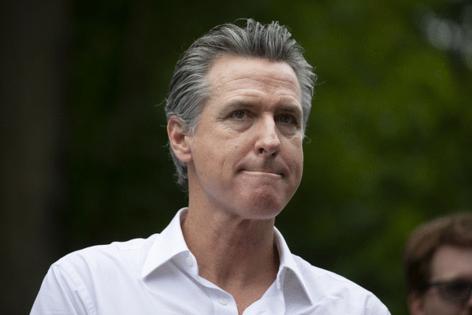Gavin Newsom agrees to more drilling to stabilize California gas prices
Published in News & Features
SACRAMENTO, Calif. — A grand energy and climate deal struck between Gov. Gavin Newsom and top legislative leaders this week could open the door to more oil drilling in the Central Valley in an attempt to stabilize California’s sensitive oil market.
When he took office, Newsom dramatically turned down California’s oil spigot, issuing fewer drilling permits as he emphasized a transition to electric and zero-emission vehicles.
But after years of painful gas price spikes and the looming closure of two refineries, drilling could ramp back up in Kern County oil fields under SB 237, a piece of the last-minute climate deal.
It’s a significant reversal for Newsom, who sees himself as a national leader on climate and once said he believes “California needs to move beyond oil.”
“Californians cannot afford $10-a-gallon gas,” GOP Sen. Shannon Grove said in a statement lauding the agreement. “It’s time to unleash Kern County producers to meet our state’s energy needs with affordable, locally produced oil for Californians by Californians.”
The bill is one piece of a sweeping, last-minute package to reauthorize California’s cap-and-trade program, which limits greenhouse gas emissions and allows companies to buy exemptions. State leaders credit the program with funding more than $30 billion in clean air and energy projects and plan to keep its existing parameters largely intact until 2045.
Also in the package, which was negotiated behind closed doors during the final days of the 9-month legislative session, were deals to replenish the state wildfire fund and create a regional electric grid for western states to trade excess energy.
The oil-related bill would give blanket approval to environmental reviews for Kern County oil wells, which have delayed drilling. It could mean up to 2,000 new wells, which would also have to be at least 3,200 feet away from schools, homes, health care facilities and other community locations.
The bill also includes restrictions for offshore pipelines and strict testing for pipelines that have been dormant for a number of years.
In a letter to lawmakers Thursday, the Western States Petroleum Association, which represents oil companies, said it was “supportive overall” of the legislation but said the pipeline restrictions “may undermine fuel supply and stability” and asked that they be removed.
Environmental groups criticized the deal as a capitulation to Big Oil’s wishes with no guarantees that it would lower gas prices.
“This bill’s wrongheaded approach acknowledges the harms of oil drilling yet takes radical steps to boost it,” said Hollin Kretzmann, an attorney with the Center for Biological Diversity. “Removing environmental safeguards won’t reverse the terminal decline of California oil production but it will allow the industry to do more damage on its way out the door. This bill would mean more air, water and greenhouse gas pollution while having no impact on refinery closures or gas prices.”
Two major California refineries have announced plans to close: Phillips 66 plans to shutter its Los Angeles-area refinery by the end of the year while Valero said it will close its plant in Benicia by the spring of 2026.
An analysis by a University of Southern California business school professor found the closures could push gas prices above $8 per gallon, which raised alarm among lawmakers.
According to a recent Bloomberg report, state officials were in talks to spend millions of dollars to keep Valero’s refinery in Benicia operating. But the deal, which is expected to get final votes on Saturday, did not include any money for Valero or Phillips 66.
The governor’s office said it is focused on getting the bills to Newsom’s desk but emphasized the bill would not be the end of conversations to ensure stable gas prices.
©2025 The Sacramento Bee. Visit sacbee.com. Distributed by Tribune Content Agency, LLC.







Comments